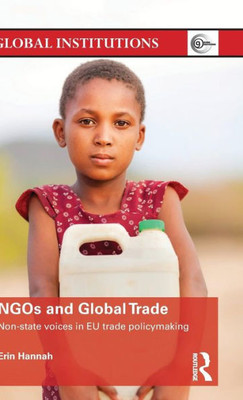

Ngos And Global Trade (Global Institutions)
Routledge
ISBN13:
9780415712637
$188.49
International trade continues to be a focal point for political and social contestation. The extension of World Trade Organization (WTO) Agreements into new areas such as investment, services and intellectual property rights engendered massive conflict and rendered ongoing negotiations infinitely more technical and complex. A chorus of legitimacy concerns were raised by the extension of trade rules beyond barriers to trade "at the border" to national regulatory regimes in a host of ostensibly non-trade areas such as food safety, environment, human health and taxation. Meanwhile, the WTO's Doha Development Round of Multilateral Trade Negotiations is trapped in seemingly endless deadlock. These developments are accompanied by the proliferation of progressive, non-governmental organizations (NGOs) who are critical of the global trade agenda. They aim to elevate social, cultural and environmental concerns of entire communities over market-related concerns in the international trade system and to give a voice to poor and otherwise marginalized groups in trade policymaking processes. This book considers whether more open trade policymaking processes that include progressive NGOs lead to a stronger, more legitimate and qualitatively enhanced international trade system. The European Union (EU) stands out among major trading powers for its significant and dramatic response to new demands for access and participation. This book examines whether improvements in the political opportunity structure for progressive NGOs results in more legitimate external trade policymaking in the EU. Hannah argues that there is clear potential for NGOs to represent citizens' demands, constitute a basic form of popular representation and hold decision-makers accountable to a broader public, and in the past NGOs have been instrumental in providing education, raising awareness, and giving a voice to broader societal concerns about the social, environmental and health-related aspects of proposed trade deals. However, they have not been able to determine policy outcomes in this arena, regardless of whether they are deeply and formally integrated into the trade policymaking process or protesting on the margins. The book builds upon the insights of constructivism to advance an alternative account of the role of NGOs in the EU's trade policymaking process, suggesting that NGOs have succeeded only when their attempts to achieve more democratic, sustainable and equitable trade policies have conformed broadly to the dominant episteme. When they seek to overrule that episteme, they fail. These findings suggest that early optimism about the power of NGOs to influence international public policy was both premature and naive. This book will be of value to scholars and students with an interest in NGOs and international trade negotiations, as well as to policymakers, national trade negotiators, government departments and the trade policy community.
- | Author: Erin Hannah
- | Publisher: Routledge
- | Publication Date: Mar 04, 2016
- | Number of Pages: 170 pages
- | Language: English
- | Binding: Hardcover/Political Science
- | ISBN-10: 0415712637
- | ISBN-13: 9780415712637
- Author:
- Erin Hannah
- Publisher:
- Routledge
- Publication Date:
- Mar 04, 2016
- Number of pages:
- 170 pages
- Language:
- English
- Binding:
- Hardcover/Political Science
- ISBN-10:
- 0415712637
- ISBN-13:
- 9780415712637





